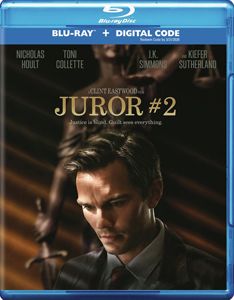“Juror #2” is another film that posits that the American justice system is severely flawed – but I’m not entirely sure if it’s on purpose. The screenplay by newcomer Jonathan A. Abrams illustrates several cracks within one rather mundane case, one that would be an open-and-shut “not guilty” except for bad behavior by the cops (which goes totally unpunished and basically excused). Yet the film also tells us, without irony, “It’s fine, because we don’t have a better system.”
Take this mild frustration as a given – nonagenarian director Clint Eastwood isn’t about to change his worldview – and “Juror #2” is a pretty solid courtroom drama.
That some are calling this a great film can be chalked up to the simple cinematic magic of a skilled director and an all-star cast. Abrams’ pedestrian script gets elevated at every turn, except when we can’t help but notice blunt dialog that I suppose could illustrate the justice system’s stupidity but also serves a base-covering function in case a viewer is equally stupid.
“Juror #2” (2024)
Director: Clint Eastwood
Writer: Jonathan A. Abrams
Stars: Nicholas Hoult, Toni Collette, J.K. Simmons
In deliberations, one juror says the defendant is guilty because his lawyer failed to prove he was innocent beyond a reasonable doubt. Although our titular protagonist, Justin Kemp (Nicholas Hoult), immediately says that’s not how it works, this line makes it clear we’re amid a rather blunt exercise. This poor defendant is nearly found “guilty by reason of the jurors wanting to go home.”
A jury of your not-so-bright peers
OK, that’s a little mean. Another juror sticks with his guilty verdict because of personal biases. A unanimous “not guilty” would also mean they could all go home, but he’s a man of his … ahem … convictions.
Although courtroom dramas can have twists – merely from a case’s complexity, without factoring in juror biases – it’s clear early on that there is no story twist forthcoming: James Michael Sythe (Gabriel Basso), despite going by his full three names, is not the killer of his girlfriend. We know this because Justin knows this, once his memory is jogged by the case’s timeline and location: Justin is the one who killed the woman, albeit by accident.
To be fair, “Juror #2” never intends to be a murder mystery; it’s an intense character study as we wonder at what point Justin will do the right thing. Also, what is his path to the right thing? In a refreshing bonus element, we see state prosecutor Faith Killebrew (Toni Collette) is also (miraculously for a politician) thinking of doing the right thing.
My big question going in to this premise (fully spelled out in the promo materials) was: Why does Justin not simply keep voting “not guilty” until there’s either a hung jury or the others agree with him? Had Eastwood and Abrams answered that it’s simply the peer pressure of 11 other people – as happens to Sir John in Hitchcock’s “Murder!” – I would’ve been disgusted.

To its credit, the film does explain why Justin doesn’t take this path. His AA sponsor (Kiefer Sutherland) says if the jury is hung, law enforcement won’t stop until they’ve figured out Justin did it. Whether contrivance or commentary on the random unfairness in the world (If police and prosecutors are lazy about the initial investigation, why would they do expert work on the do-over?), the film at least addresses the elephant in the plotting room.
Performances make a strong case
Top-shelf performances come from Hoult, who has become a handsome Everyman similar to his fellow “X-men” alum James Marsden, plus J.K. Simmons as the (refreshingly) one juror who wants to vote via facts rather than his desire to be done with jury duty. And Collette and her opposing counsel – Chris Messina – are good enough that we almost can overlook the lawyers’ dual misfire in picking a jury that includes a half-dozen idiots and the actual killer.
I mean, even the writers of “Perry Mason,” who always had the actual killer as a witness, never thought of putting the actual killer in the jury.
But for all the contrivances of Abrams’ screenplay, it’s propulsive because the structure overcomes the lack of mystery and the bluntness of the suspense (Will Justin and/or Faith do the right thing?). The procedural steps happen at a faster clip than I would’ve assumed, leaving me slightly but intriguingly out of step with where I think “Juror #2” is going.
The big moment in this genre is the reading of the verdict, but this story is far from over at that point, because the suspense and character arcs have not been satisfied. Eastwood and Abrams ratchet up these elements slowly and they are still going till the end.
“Juror #2” is a clearly delineated (if also clearly fictional) court case, and many jury-room discussions are equally free of nuance, unless this is a viewer’s very first courtroom drama. For all the movie’s bluntness, the internal torment of Justin is always evident. “Juror #2” is not half bad beyond a reasonable doubt.

